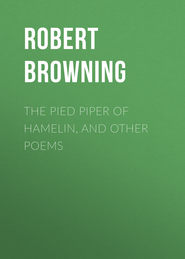По всем вопросам обращайтесь на: info@litportal.ru
(©) 2003-2024.
✖
Pomegranates from an English Garden
Настройки чтения
Размер шрифта
Высота строк
Поля
VI
Guercino drew this angel I saw teach
(Alfred, dear friend!) – that little child to pray,
Holding the little hands up, each to each
Pressed gently, – with his own head turned away
Over the earth where so much lay before him
Of work to do, though heaven was opening o’er him,
And he was left at Fano by the beach.
VII
We were at Fano, and three times we went
To sit and see him in his chapel there,
And drink his beauty to our soul’s content
– My angel with me too: and since I care
For dear Guercino’s fame (to which in power
And glory comes this picture for a dower,
Fraught with a pathos so magnificent),
VIII
And since he did not work thus earnestly
At all times, and has else endured some wrong —
I took one thought his picture struck from me,
And spread it out, translating it to song.
My love is here. Where are you, dear old friend?
How rolls the Wairoa at your world’s far end?
This is Ancona, yonder is the sea.
“The Guardian Angel” is given as a slight specimen of an important class, dealing with painting and painters. In the lovely poem, “One Word More,” Browning disclaims all ability to paint; but no one could have a more exquisite appreciation of the art.
Has the tender pathos of these verses ever been surpassed? The calm of heaven is in this thought spread out – translated into song. Let it be read in connection with Spenser’s exquisite lines, beginning “And is there care in heaven?”
“Alfred, dear friend,” is Mr. Alfred Domett, who was then Prime Minister of New Zealand, at which far end of the world the Wairoa rolls to the sea.
DEAF AND DUMB
A GROUP BY WOOLNER
Only the prism’s obstruction shows aright
The secret of a sunbeam, breaks its light
Into the jewelled bow from blankest white;
So may a glory from defect arise:
Only by Deafness may the vexed love wreak
Its insuppressive sense on brow and cheek,
Only by Dumbness adequately speak
As favoured mouth could never, through the eyes.
This is a “gem of purest ray.” In order to understand it fully, it is necessary to know that the “group by Woolner” is of two deaf and dumb children – the one as if speaking, the other in the attitude of listening. The speech denied passage through the lips, breaks out in rarer beauty from the eyes; and for the hearing denied entrance by the ears, there is, instead, a subtle responsiveness of brow and cheek to the spirit utterance from the soul of the other; so that love, though “vexed,” is not suppressed.
The exquisite beauty of the illustration of “the prism’s obstruction,” and the tender pathos of the thought, will be manifest to every reader.
ABT VOGLER
(AFTER HE HAS BEEN EXTEMPORIZING UPON THE MUSICAL INSTRUMENT OF HIS INVENTION.)
I
Would that the structure brave, the manifold music I build,
Bidding my organ obey, calling its keys to their work,
Claiming each slave of the sound, at a touch, as when Solomon willed
Armies of angels that soar, legions of demons that lurk,
Man, brute, reptile, fly, – alien of end and of aim,
Adverse, each from the other heaven-high, hell-deep removed, —
Should rush into sight at once as he named the ineffable Name,
And pile him a palace straight, to pleasure the princess he loved!
II
Would it might tarry like his, the beautiful building of mine,
This which my keys in a crowd pressed and importuned to raise!
Ah, one and all, how they helped, would dispart now and now combine,
Zealous to hasten the work, heighten their master his praise!
And one would bury his brow with a blind plunge down to hell,
Burrow awhile and build, broad on the roots of things,
Then up again swim into sight, having based me my palace well,
Founded it, fearless of flame, flat on the nether springs.
III
And another would mount and march, like the excellent minion he was,
Ay, another and yet another, one crowd but with many a crest,
Raising my rampired walls of gold as transparent as glass,
Eager to do and die, yield each his place to the rest:
For higher still and higher (as a runner tips with fire,
When a great illumination surprises a festal night —
Outlining round and round Rome’s dome from space to spire)
Up, the pinnacled glory reached, and the pride of my soul was in sight.
IV
In sight? Not half! for it seemed, it was certain, to match man’s birth,
Nature in turn conceived, obeying an impulse as I;
And the emulous heaven yearned down, made effort to reach the earth,
As the earth had done her best, in my passion, to scale the sky:
Novel splendours burst forth, grew familiar and dwelt with mine,
Not a point nor peak but found, but fixed its wandering star;
Meteor-moons, balls of blaze: and they did not pale nor pine,








